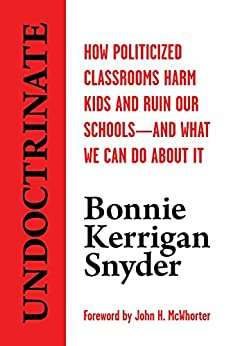The Volokh Conspiracy
Mostly law professors | Sometimes contrarian | Often libertarian | Always independent
Getting Back on Track
CRT, professional licensure, and teacher accountability.
The temptation to use the K-12 classroom to enact partisan aims is eternal, and arguments about what should or should not be included are perennial. There is no shortage of people or organizations who think they know what educators should or should not be covering in school. After all, if one can convince young people of certain ideological viewpoints, while restricting their access to dissenting opinions, one can exert a tremendous amount of influence over the future of society.
The currently most talked-about iteration of perceived educator overreach — colloquially referred to as "critical race theory" or "CRT"— is but one example in a long line of curricular changes that have attracted concern and sparked a popular backlash. In previous eras, teachers were accused of inappropriately promoting a Christian-dominated worldview, or other non-secular aims, thereby violating the aim of separating church and state. Evangelicals have had to learn that they can't co-opt the classroom to promote their belief system in a secular school; so, too, now must passionate advocates of CRT, anti-racism, and other currently popular doctrines. We need committed teachers, not preachers, in American public schools.
Whatever the ideology in question, the essential issue remains the same: using the classroom and access to other citizens' children to promote or attempt to enact a preferred worldview. Of course, the state has its own aims that it is trying to achieve with the public funds that it directs towards the "government speech" that takes place in public school classrooms. This has traditionally been understood to be along the lines of promoting domestic tranquility that leads to desirable levels of shared civic identity and cultural bonds, promoting desirable levels of social cohesion—creating unum out of the pluribus. Violation of this expected norm is precisely what has led to the "divisive concept" bills that have been proposed or enacted in opposition to curricular shifts across the country.
Teachers in public schools are tested, certified, and licensed by their specific states in the same way that dentists, doctors, and even (more questionably) cosmetologists are, and for the same basic reason: they are all entrusted to serve in a capacity where they are in a position to do potential harm. In the case of teachers, they serve what is probably our most vulnerable and cherished population: children. They are also expected to conform themselves according to ethical standards of practice, which are clearly outlined by state boards of education, unions, and disciplinary organizations.
To cite but one example of clearly stated ethical guidelines, the National Education Association's own Code of Ethics for Educators says that their commitment to the student involves stimulating a "spirit of inquiry;" that they shall not "unreasonably deny the student's access to varying points of view" or "deliberately suppress or distort subject matter relevant to the student's progress."
While parents rarely know the exact contours of these standards, they know they exist, and are perplexed and disappointed to see educators behaving in ways that are clearly counter to them.
Fellow educators, of course, are also charged with policing the integrity of the profession by holding bad-faith actors accountable. How sad, then, to see that in many cases it has been up to students to document teacher misbehavior by resorting to filming encounters using their personal cell phones — a practice that itself fosters an environment of suspicion.
These ethical standards are in place in part to ensure that students are regarded as autonomous, self-directing ends in themselves, rather than merely as means or implements towards achieving others' goals. It is simply never appropriate to take advantage of the youth and immaturity of minors, who are compelled to be in attendance by law and deprived of the presence of parents or legal guardians who have long trusted educators to act appropriately in their place (in loco parentis) during school hours. Responsible and sometimes outraged parents who would have acted to prevent such measures had they been present are now coming forward to do so after the fact, as such incidents come to light, spurred on by the increase in remote-learning-driven parental awareness of classroom pedagogy. For a large group of parents, the broken trust caused by the violation of ethical norms will take years, if not decades, for the education profession to repair. This is the cost of failing to uphold professional standards.
Controversial topics can be handled professionally and effectively in a K-12 classroom. They can also be mishandled in a way that has the potential to mislead or misinform students. The difference lies in recognizing the freedom of conscience rights of students to reach their own conclusions without undue influence by those who hold authority over them.
FIRE has always been a college-focused organization. Yet we now hear regularly from distressed parents and students who feel that K-12 classroom teachers are bullying students into artificial compliance with preferred viewpoints, or into silence for fear of repercussions if they dare to voice dissent. For all the self-consciously professed concern over power and oppression dynamics embedded in critical race theory, it is impossible to overlook the irony at the heart of its heavy-handed implementation by certain overzealous, unprincipled actors: a near-total lack of recognition of the vast power differential wielded by a teacher over a student, and by an adult over a child. This authority must never be misused by a responsible, ethical, scrupulous K-12 educator.



Show Comments (65)